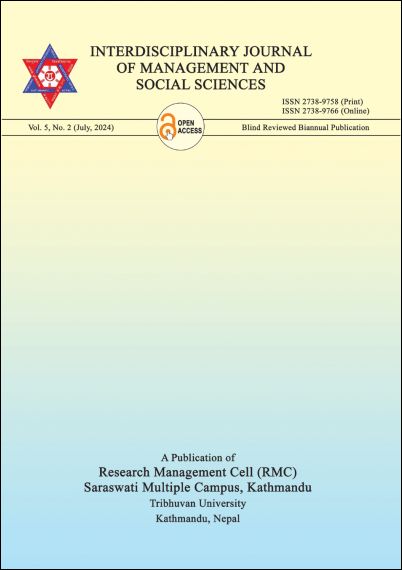Influence of Youth Engagement on Nepal's Political Evolution: An Analysis of Emerging Youth-Led Movements
DOI:
https://doi.org/10.3126/ijmss.v5i2.69438Keywords:
political movement, youth participation, inclusion, political transformation, youth leadershipAbstract
This research investigates the increasing influence of youth participation on Nepal's political evolution, focusing on the rise of youth-led movements and initiatives. The purpose of the study is to analyze how increased political participation among youth has shaped recent political developments and policy changes in Nepal. Utilizing secondary data sources, including academic journals, government reports, and credible databases, the study employs a qualitative approach to evaluate historical and contemporary youth movements. Key variables measured include the extent of youth involvement in political activities, the impact of social media in mobilizing youth, and the resultant changes in political policies and governance. The findings reflect that youth-led movements have significantly contributed to political discourse and policy reforms in Nepal, highlighting the critical role of digital platforms in facilitating this engagement. For instance, the #OccupyBaluwatar movement of 2012-2013 successfully pressured the government to address issues of gender-based violence, leading to policy amendments and the establishment of more stringent laws for women's safety. Similarly, the advocacy by the Youth Parliament Nepal has been pivotal in incorporating youth-centric agendas into the national budget, promoting policies on education, employment, and entrepreneurship. Challenges such as institutional barriers and societal resistance are identified, enshrining the need for strategic interventions to support sustained youth participation. These findings reflect the necessity of creating supportive frameworks that enable continuous youth involvement in political processes, ensuring that their voices lead to tangible policy outcomes. The study signifies that harnessing the potential of youth is vital for the progressive political transformation of Nepal and for fostering a more inclusive political environment. By addressing the obstacles and leveraging the strengths of youth engagement, Nepal can achieve a more dynamic and representative governance structure.
Downloads
Downloads
Published
How to Cite
Issue
Section
License

This work is licensed under a Creative Commons Attribution-NonCommercial 4.0 International License.

